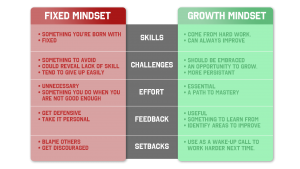Intelligence is Not Wrapped in a Box Under the Christmas Tree
Carol Dweck’s essay “Is Math a Gift? Beliefs That Put Females at Risk” explains the research that suggests the approach to intellectual ability as a gift leaves women vulnerable to discouragement from the challenges of math and science. Dweck’s study with Licht in 1984 showed that girls in fifth grade, who had not yet been exposed to the stereotypes of females’ math abilities, were not able to cope with new confusing material. Although they were bright girls earning higher grades than boys, they were unable to learn after encountering the confusing setback, while the boys were much successful and “energized” by the confusion. Her later research demonstrated the girls were affected in this way because they viewed intelligence as a fixed entity, so they lost their motivation from the setbacks because their confusion signaled that they did not have this “gift.” When female students believe their intelligence can be expanded, there is almost no gender gap in performance, as exhibited in Dweck and Grant’s study of first year students at Columbia University in 2003.
Dweck wanted to reverse this issue so she researched how to give women more lasting confidence. She starts by countering the assumption than praising students’ abilities is the obvious solution. Her research with Mueller in 1998 demonstrated that praise actually just reinforces that intelligence in a gift and makes students resistant to taking on challenges where they could make mistakes. Instead, women need to be taught the “nature of ability” as capable of growth. To accomplish this, she designed an intervention that taught a group of students that skills can be developed, which was successful in significantly increasing the math grades over the control group that was not exposed to this way of thinking. She concluded that “learning intellectual skills could be acquired – rather than simply bestowed as a gift – led to important gains in female students’ math achievement.” She stresses the messages that underly teaching really do matter and the can be adjusted to allow females to reach their full potential.

(picture source: http://trainugly.com/mindset-makers-breakers-pt1/)
As I read this chapter, I almost felt inspired by Dweck’s findings. I agree with her idea “there is no genius, no great contributions, without great effort.” All of Dweck’s research comes back to the idea of the entity versus incremental theories of intelligence. When women see their learning from an entity theorist’s perspective, they fall vulnerable to the setbacks of challenges and worry their fixed capabilities are not enough to allow them to be successful. When women see their learning from an incremental theorist’s perspective, they are less phased by setbacks and have the believe that they can increase their learning and persevere through an obstacle. This was discussed in the first essay with the contrasting test scores of Japan and the United States (Valian, pg. 29). Our education system in the U.S acts as an entity theorist, while Japan acts as an incremental theorist. It is not surprising that Japan has the higher scores no matter gender since they are teaching their students with the messages that they can improve their intelligence and should embrace challenges for growth. I think I could attribute my success in high school to my dedication to hard work and attitude that my effort would earn my grades, not any inherent ability. I am very self motivated, but I could easily see how that motivation would disappear if I thought my efforts did not matter and my success had been predetermined by the “gifts” with which I was born.
Leave a Reply